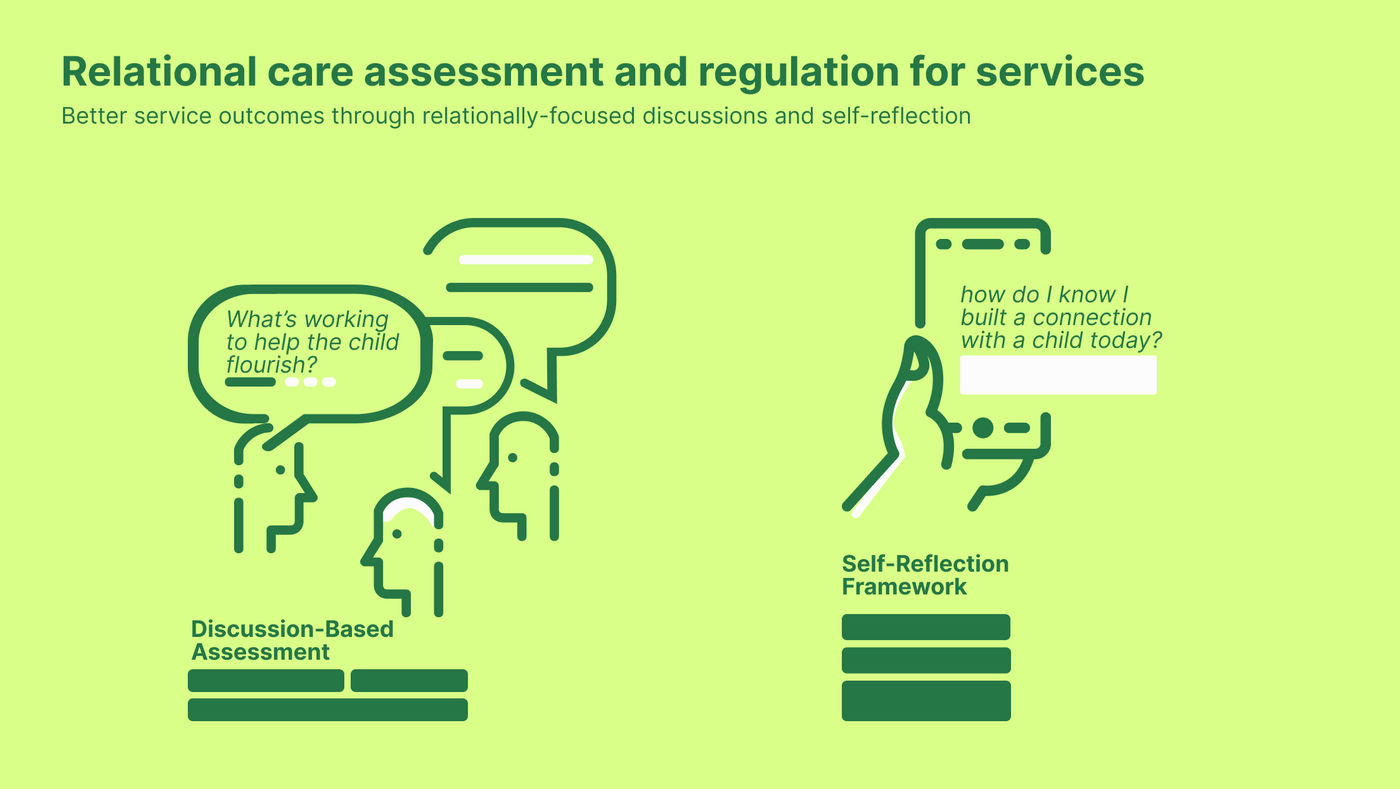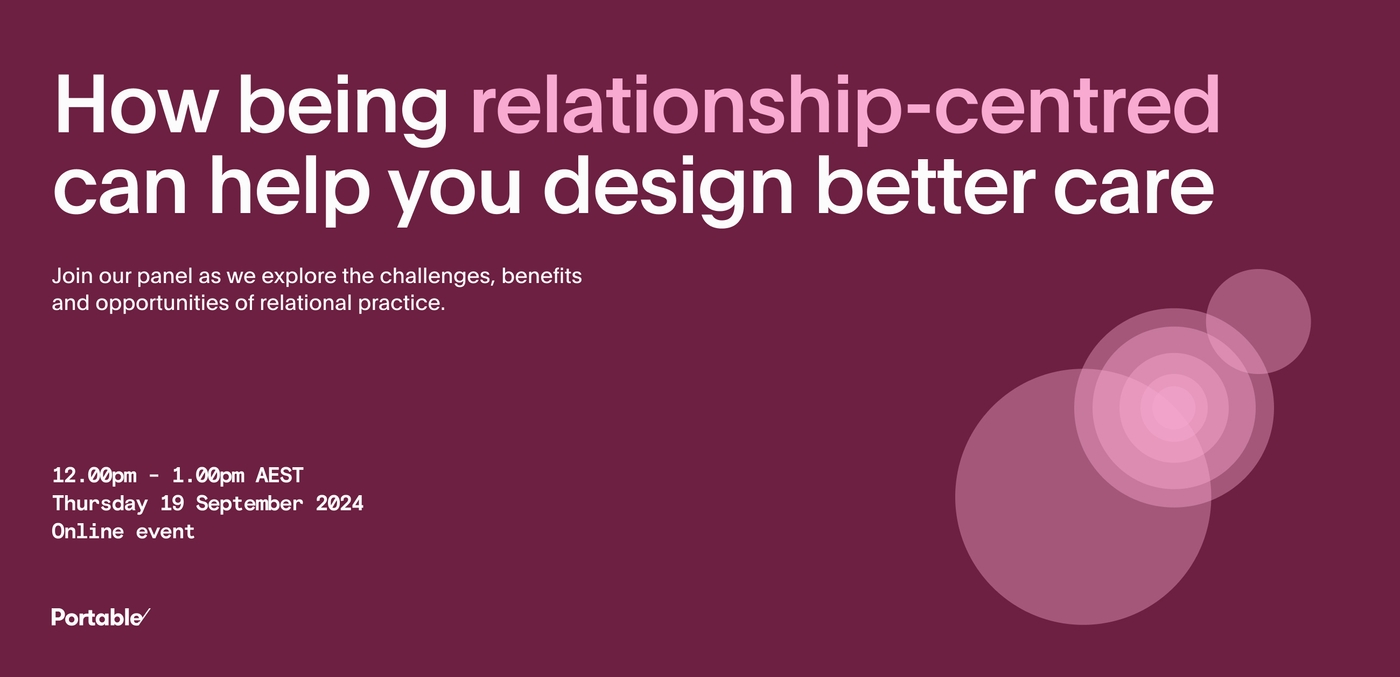To connect is human. Everyone, including young people, need relationships to thrive. The Centre for Relational Care aims to transform out-of-home care from child protection to child connection. We started this journey with a design dialogue with sector stakeholders to explore how this vision could
be realised.

There are currently 46,000 children in out-of-home care (OOHC) in Australia. Many of these children don’t get to experience long-term safe and secure relationships due to systemic, legal and bureaucratic barriers. The Centre for Relational Care, who launched in December 2023, is an independent, not-for-profit advocacy body wanting to radically transform Australia’s child protection and out-of-home care system.
To start this journey, the CRC wanted to bring together a diverse group of stakeholders to reimagine a more relational out-of-home care system. Portable was engaged to design and facilitate a series of collaborative design dialogues to support this important visioning work.
The challenge
The main project goal was for CRC to collaboratively develop a blueprint for transforming the out-of-home care system. Portable was engaged to design and deliver 2 strategic workshops to help stakeholders progress from discussions about the need for change to envisioning key action areas and more specific interventions that could attract funding.
Our approach
We approached the workshops as a 'design dialogue,' combining a solutions-focused, human-centred design process with an open exchange of ideas to foster mutual understanding and connection
Both workshops brought together a diverse community experienced in out-of-home care and child protection systems to address key strategic questions for the blueprint for change. The workshops would explore what it means to prioritise relationships in the system, identify where and with whom changes need to occur, examine enablers and barriers to change, and discuss how to implement these changes and where to start.
Workshop 1: What change is needed
Workshop 1 was designed so that participants could explore the problem holistically by unpacking the complexity at multiple levels so that effective solutions could be considered. These multiple levels included access to services, well-being outcomes, interpersonal relationships in the system, workforce capability, regulatory frameworks, community awareness, and interagency collaboration.
We then used design activities that allowed groups to make their ideas more tangible and specific. This included prototyping potential solutions and areas of action and identifying the scope and scale of those potential solutions.
At the completion of workshop 1, we analysed and synthesised the workshop outputs to provide CRC with a concise and compelling overview of:
- Key Problems: the main issues that highlight the need for change.
- Declarations of Change: a guiding vision about shifting from an institution-centred to a child-centred care system.
- Pathways to Change: the key challenges that need to be addressed to achieve this transformation.
- Prioritised Action Areas: 3 design briefs to be explored, in more detail, in the second workshop.
Workshop 2 - where might we start
Workshop 2 was focused on narrowing down to a set of initial problems to solve, those the group believed would drive impactful change. By narrowing the focus, participants could concentrate on a starting point that the CRC could pursue with funding support.
Groups focused on 1 of 3 design briefs, designing key elements of the solution including:
- Key characteristics of the solution
- Requirements for making the idea work
- Defining the boundaries of the solution (what it is not)
- How the solution could be measured, relationally
- Initial steps to advance the idea
At the completion of workshop 2 Portable analysed the 3 conceptual solutions that had been developed and identified important enablers that each initiative would need. Not only focusing on a relational approach but prioritising emotional well-being, focusing on prevention earlier in the system, and taking a collaborative care approach too.
Each conceptual solution was then documented and visually represented so that CRC could tell the story of their strategic approach as well as the tactical solutions to realise the visions of child ‘connection’ system.
Our reflections
- CRC can clearly articulate a vision for change for the child protection system and out-of-home care
- CRC can demonstrate how a relational approach would work on the ground through specific conceptual solutions
- CRC can demonstrate their engagement with the sector and the collaborative approach that developed this vision for change
- CRC is presenting a compelling case for change to potential funders to get secure support for the initial phases of their transformation blueprint.
Through our collaborative workshops, we helped CRC transform broad discussions into actionable strategies, laying the groundwork for key projects that will drive change. Harnessing the energy in the room and exploring different perspectives and experiences was powerful and rewarding.
Watch the recording of our Relational Care Webinar
Leaders in sectors like aged care, disability support, and family services are under immense pressure to deliver high-quality care in the face of shrinking budgets and growing social needs. As government spending tightens and the demand for care continues to rise, transformation must go beyond efficiency and cost-cutting. This is a time for deep, meaningful innovation that puts people at the centre.
Check it out here